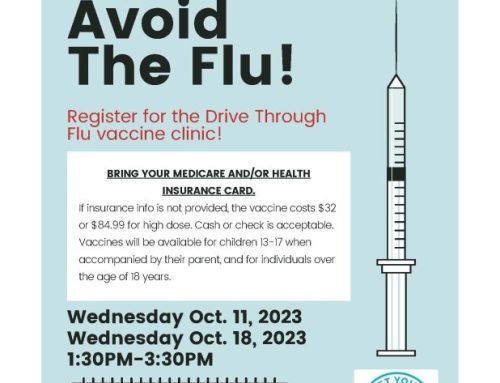Ashley Driscoll, RN, APN
Board Certified Family Nurse Practitioner
It’s that time of year again, flu season; which also means that it is flu shot season. Studies show that one in five people get the flu each year. According to the Centers for Disease Control and Prevention (CDC), the best way to prevent the flu is by getting your flu shot. Not to mention, getting the flu vaccine is a great way to keep your loved ones healthy, especially those who cannot get the vaccine. (However, it is recommended for everyone over the age of 6 months, with rare exceptions.)
Here are some answers to questions you may have about the flu and the flu shot:
- What is the flu? Influenza or “flu” is a contagious viral illness spread by coughing, sneezing, and close contact with infected individuals. It comes on suddenly with typical symptoms including fever, headache, sore throat, fatigue, runny nose…and just feeling awful! While anyone can become severely ill with the flu, the complications and risks are increased for young children, adults over 65, pregnant women and those with preexisting health conditions. It can lead to pneumonia, seizures, blood infections and death. Last year an estimated 26,000 children under age 18 were hospitalized with complications from the flu. Additionally, 90% of flu-related deaths were in people over the age of 65 years.
If you think you have the flu, it is important to call your doctor’s office. A rapid test via a nasal swab can be performed to confirm the diagnosis of influenza. If positive, an antiviral medication can be prescribed to shorten the duration and severity of symptoms, but it needs to be started within 48 hours of symptom onset. It is very important to stay home from school, work, and church to avoid infecting others. - Can getting the flu shot give me the flu? No! The vaccine is inactive (with the exception of the nasal spray which is live and not recommended this year) and therefore it cannot give you the flu. However, as your body produces antibodies in response to the vaccine to build up immunity, you can experience fatigue, body aches, a low-grade fever, sore throat, headache or reactions (such as pain, redness, or swelling) at the injection site.
- If I get the flu shot, can I still get the flu? Unfortunately, yes. There is no guarantee that you will not get the flu, however, it still provides protection. The vaccine lessens the severity and course of symptoms, as compared to those who did not receive the vaccine. In my experience, the difference is significant in patients with the flu who have had the vaccine versus those who have not.
- Why do I have to get another shot if I had one last year? The body’s immune response declines over time and flu viruses constantly change from season to season, making it necessary to be vaccinated every year for the best protection.
- Where can I get the flu shot? The flu vaccine is now widely available. You can get it at your primary care doctor’s office, public clinics, drug stores, and many grocery store pharmacies. Some employers even offer flu shots at work. The vaccine is easy to give and those administering the vaccine are trained to do so. This means there is little to no reason not to get your vaccine today!





